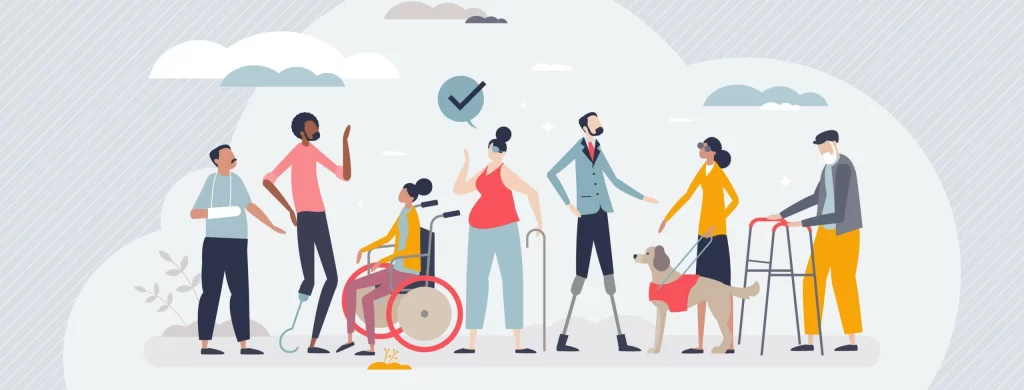
What is a disability?
A disability is a physical or mental impairment that interferes with one or more major life activities. Examples of common disabilities include:
- Vision impairment
- Hearing loss
- Deafness
- Mobility impairment
- Learning disorders
- Intellectual disabilities
- Chronic illnesses, like HIV or diabetes
- Cancer
- Mental health conditions like depression, posttraumatic stress disorder (PTSD), or schizophrenia
The relationship between disability and mental health
Many people with disabilities don’t experience mental illness. And having a disability doesn’t mean you’ll develop a mental health disorder. But mental health and disability do relate to one another, and they can intersect in several ways. For example:
- Increased risk of co-occurring conditions. Having a disability may increase your risk for mental health disorders like anxiety and depression. Individuals with disabilities are at higher risk of unemployment and poverty, both of which can cause mental distress. Discrimination can also affect your mental health; competent health care is hard to find.
- Separate but related conditions: If you have a disability and a mental health disorder, they can interact or overlap. For example, say you have both depression and a chronic autoimmune disease. If you have a flare up of your condition, your depression may worsen.
Is mental illness a disability?
You can have a mental illness without it being considered a disability. Some mental health disorders, however, are legally considered disabilities.
The Social Security Administration (SSA) allows adults to receive Social Security disability benefits for certain mental health disorders, but their requirements are very strict.You can have a psychiatrist’s diagnosis of a mental illness and still not qualify as having a legal disability. The tools a therapist uses to diagnose an anxiety disorder, for example, are very different from the SSA’s requirements to determine whether that anxiety disorder qualifies as a disability.
Physical disabilities and mental health
If you have a physical disability, it can affect your mental health in many ways. Common experiences include:
- Adjustment: You may develop a physical disability later in life, or your lifelong disability may change over time. Both scenarios require you to adjust to new challenges. The adjustment period can present mental health challenges.
- Isolation: Some people with physical disabilities isolate themselves as they work to come to terms with their body, identity, or disability. Others may wish to socialize but be unable to because of accessibility issues. Some people experience isolation due to social rejection or discrimination. Children in particular may experience bullying if their disability makes them noticeably different.
- Distress: The Centers for Disease Control (CDC) estimates that adults with disabilities experience mental distress nearly five times more often than adults without disabilities.
- Discrimination: People with disabilities may experience ableism, a form of discrimination that favors people without disabilities. Anyone can be guilty of ableism, including doctors,employers, and others in position of power. The stress, anger, and sadness that result from this discrimination can have mental health impacts.
Intellectual disabilities and mental health
What are IDDs?
An IDD is an intellectual and developmental disability. IDDs affect a person’s ability to learn, reason, socialize, communicate, or develop. These conditions are permanent and typically diagnosed during childhood. They often severely impact a person’s ability to live on their own.
Disability vs. disorder
Having an intellectual disability is different from having a mental health disorder. Intellectual disabilities severely affect your general mental functioning, including your ability to reason, learn, problem-solve, and engage in abstract thinking. In contrast, mental health disorders affect your mood, thought patterns, and behaviors but usually don’t directly impact your cognitive abilities.
Double diagnosis
It’s possible to be diagnosed with both an IDD and a mental health disorder. One study estimates that nearly 40% of children with an IDD have a co-occurring mental health disorder.
Types of therapy
Many different types of therapy are available to help you address your physical and mental health. You may find one or more of these common forms of treatment for mental and medical conditions helpful:
- Occupational therapy focuses on healing, strength, and adjustment to help patients engage in daily activities with confidence.
- Physical therapy helps improve, strengthen, and recover physical abilities.
- Speech therapy improves communication skills.
- Art therapy uses creativity and artistic mediums to improve psychological and emotional health.
- Music therapy employs music to address physical, mental, and emotional health.
- Equine therapy involves therapeutic activities with horses.
- Massage therapy can release tension and improve physical and mental health.
- Cognitive behavioral therapy (CBT) addresses unhelpful or negative thought patterns that affect emotional and mental health.
Seeking therapy
It’s important to get professional treatment when you’re struggling with your mental health. Here are some tips to help you find the care you need:
- Choose a therapist who’s a good fit. Finding the right therapist can be a challenge. It’s important to choose a therapist who understands how your particular disability affects your mental health. Schedule Consultation with us.
- Find a support group. Support groups can be an excellent resource for people with disabilities or certain mental health disorders. You may benefit from an in-person or online community of people facing similar challenges.
- Prioritize all aspects of your health. Your disability may feel overwhelming at times, but it’s just one aspect of your overall health. Don’t be afraid to seek help for all aspects of your mental and physical health. You deserve care and support.
If you’re having a mental health crisis, free help is available now. Call or text one of the following helplines:
Crisis Text Line: Text HOME to 741741
988 Suicide & Crisis Lifeline: Call 988
